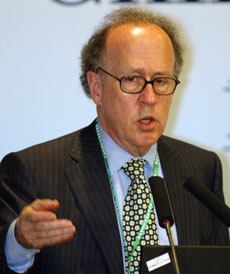US should look in mirror: Economist
By Zhu Qiwen (China Daily)Updated: 2007-03-20 06:56
Politicizing the China-US trade relationship will not fix the bilateral imbalance between the two countries, a US economist said.
 Stephen Roach, chief economist of Morgan Stanley, speaks at a forum in Bo'ao, Hainan Province in this April 22, 2006 photo. [newsphoto]  |
"The United States can do a much better job in boosting its savings rates," Roach told China Daily during an interview on the sidelines of China Development Forum, which closed Monday, March 19.
The two-day high-level forum was organized by the China Development Research Foundation to discuss China's transition towards new economic growth models.
"China knows it has a lot of imbalances to deal with. It is trying to put policies in place to deal with its imbalances on its own terms," Roach, a long-term observer of the Chinese economy, said.
China has registered double-digit growth for four years while corporate profitability kept improving and inflation remained modest.
However, a ballooning trade surplus, especially the bilateral one over the US, has made China an easy target for blame by some US politicians in recent years.
Thanks to its comparative advantage as a low-cost manufacturing power, China's trade surplus surged to a record US$178 billion last year, up 74 percent from the previous record of US$102 billion in 2005.
Meanwhile, the US suffered from the mother of all trade deficits an external imbalance that hit about 7 percent of its gross domestic product in 2006 largely due to excess consumption.
In face of increasing external imbalances, China is trying hard to reduce its reliance on exports and boost domestic consumption. And to achieve energy-saving, environmentally friendly sustainable development, the country even lowered its growth target this year.
Rather than facing up to its own imbalances as a result of an unprecedented saving shortfall, "the US approach has been to blame China for imbalances by maintaining undervalued currency", Roach said.
"Structural adjustments are hard to accomplish for any economy. But that does not mean it should not be done because the longer the global economy continues to become more imbalanced, the greater the chance we would have some type of crisis."
|
||
|
||
|
|